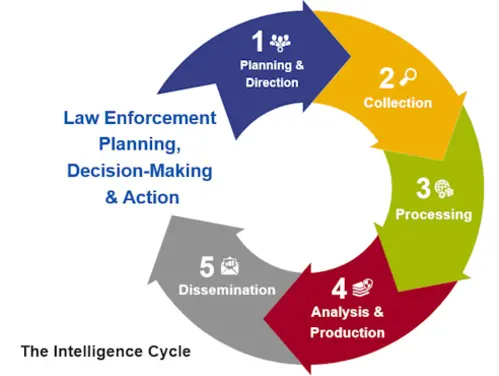Jobs at the Iowa Division of Intelligence & Fusion Center
Most of the employees of the Iowa Department of Public Safety's Division of Intelligence and Fusion Center are Criminal Analysts. Criminal Analyst positions are non-sworn and classified as civilian. Candidates for civilian positions within state government must meet qualifications established by the Iowa Department of Administrative Services. A description of the various Criminal Analyst positions can be found below:
| Civilian Jobs |
|---|
| Criminal Intelligence Analyst |
| Criminal Intelligence Analyst Senior |
| Criminal Intelligence Analyst Advanced |
The Intelligence Production Cycle
The Division of Intelligence and Fusion Center applies the intelligence cycle to accomplish the tasks that fall under the Division's responsibilities. The intelligence cycle, as it pertains to criminal intelligence, is the process of developing raw information into finished intelligence for consumers, including policymakers, law enforcement executives, investigators, and patrol officers. These consumers use this finished intelligence for decision- making and action. Intelligence may be used, for example, to further an ongoing investigation, or to plan the allocation of resources.
The intelligence cycle consists of five steps:
- Planning & Direction
The planning and directing step is needed for organizing a big intelligence project from start to finish. It begins by figuring out what information is needed and ends when that information is given to someone who needs it to make decisions. This step is both the beginning and ending of the cycle because it starts the process by deciding what needs to be done and ends it by finding new questions that need answers. This process is based on what the people who use the information need. These people can be from different parts of the government or have different jobs like policymakers or police officers. Understanding what intelligence consumers need is crucial. - Collection
Collection is the gathering and reporting of raw information, or basic facts, needed to make detailed intelligence reports. To do this well, there must be a plan and a clear focus on what is needed. Many different places can be used to find these facts, including government records, news stories, the internet, magazines, and books. Even though it's often not given enough credit, collecting information from these public sources is very important for an intelligence team's ability to analyze situations. There are also secret sources of information. Police gather such information from different places, like from people reporting crimes, from their own investigations, and from talking to people involved in crimes. To collect this information, police use many methods, such as interviews, undercover work, and physical or electronic surveillance. - Processing
In the processing step, all the unsorted, raw information that has been collected is made usable. This is accomplished through information management. This includes typing data into computers, making data smaller or simpler, organizing physical papers into order, and other ways to keep information neat and findable. Doing this well means understanding what the people who will use the information need, what type of information we have, how we plan to collect more information, and our plan for analyzing it. Analysis & Production
This step involves turning basic facts into useful intelligence. It involves looking at, evaluating, and combining different pieces of information which might be incomplete or seem to contradict each other. Then, analysis experts make sense of this information and use it to create reports. These analysts consider the validity and trustworthiness of the information. They put the pieces together in a way that makes sense and write up their findings, explaining what they think it means and why it's important for the people who need to use this information.These findings can help big decision-makers in the government or law enforcement figure out their next moves. The work can focus on big-picture planning for the future, helping with ongoing investigations, or dealing with urgent issues that need immediate action. By keeping an eye on current events, both related and unrelated to crime, analysts help warn leaders about possible dangers to public safety and try to predict what might happen next in the world of crime. They might summarize their findings in short briefs or in more detailed reports, depending on what is needed.
- Dissemination
The final step, which logically leads back to the start, is when the completed intelligence information is shared with the people who needed it in the first place. These people use it to make choices or take steps based on what they have learned. There should also be a chance for them to give feedback on how useful the intelligence was. Their decisions, actions, and feedback can result in asking for more information, which starts the intelligence cycle over again.
